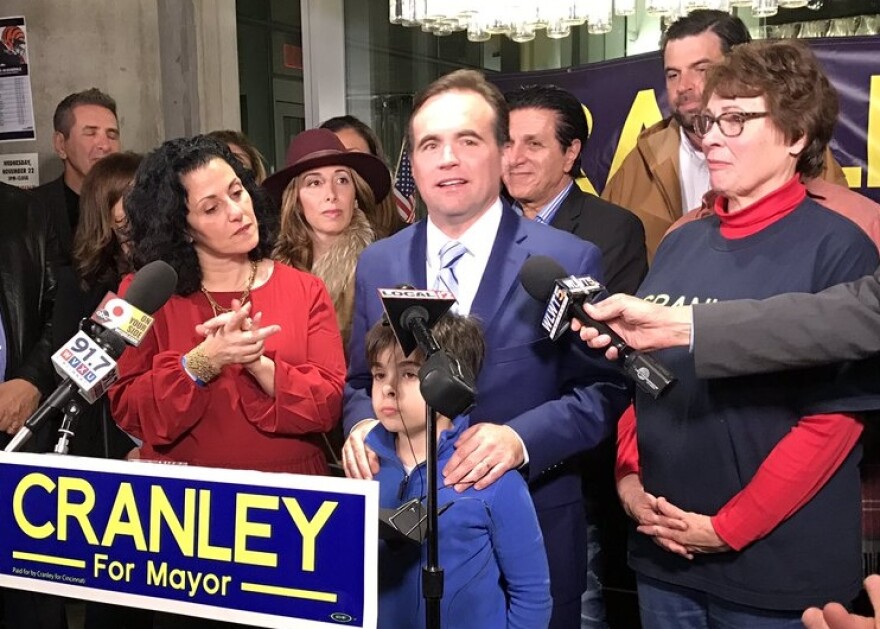John Cranley has won another four years as Cincinnati's mayor in a romp over Council Member Yvette Simpson.
Cranley bested Simpson with 54 percent of the vote to Simpson's 46 percent in the unofficial vote count.
It was a raucous, expensive (Cranley raised in the vicinity of $3 million for his campaign), and often vitriolic battle between two candidates who had their differences on the issues and who clearly didn't like each other.
It was a complete reversal from the May primary when only 11 percent of Cincinnati voters showed up in a three-way race. Simpson came out on top, besting Cranley by 11 percentage points.
Simpson, 38, conceded the election at a gathering of supporters at Queen City Radio at about 10:40 p.m.

Shortly after 10 p.m., Cranley, his wife Dena and his young son, Joseph, stood in front of a large crowd at a victory party at the Americano Burger Bar downtown.
While he never said the words, "I won," he made it clear he thought he was headed for a second term.
"This comeback city has made me the comeback kid," Cranley said, a reference to his loss in the primary. "Now, the trends are with us; this city is coming back, neighborhood by neighborhood."
He congratulated Simpson on her May primary victory, "her public service, and her spirited campaign."
Simpson told her supporters she was "proud of how we ran."
"We could have gone ugly; we could have gone dirty; we could have thrown mud," Simpson said. "We didn't attack anybody's character; we talked about a bright future for the city."
Cranley vowed after the primary that he had learned his lesson and said he wouldn't run a campaign made up of nothing but TV ads. Instead, he said he would shift the focus to a ground game, where he and his campaign made personal contact with the voters.
In the final weeks of the campaign, Cranley's campaign volunteers knocked on 90,000 doors and followed up again with each of them.
"We talked to people on their doorsteps; and we listened," Cranley said.
Over the next four years, "we are going to build the greatest comeback city in the country."
Simpson did much the same thing in terms of grassroots campaigning, but Cranley seemed to have had more success, with turnout highest in some of the precincts where his greatest strength was – Hyde Park, Mount Lookout, Mount Washington, and in swing districts in neighborhoods like Pleasant Ridge and College Hill.
He even cut into Simpson's lead in some predominately African-American neighborhoods, winning 34 percent of the vote in Bond Hill. Most analysts would have predicted about 20 percent for Cranley there.
In his first term, Cranley developed a reputation as a combative advocate for his agenda, sometimes rubbing people the wrong way – particularly some fellow Democrats on city council.
Two years ago, he pushed it too far, becoming the face of a permanent tax levy for city parks, which the voters soundly rejected after a campaign in which opponents argued it would do little to improve the parks and more for developers.
He said afterwards that he had learned his lesson and would be more willing to work with his opponents to find compromises both sides could live with.



